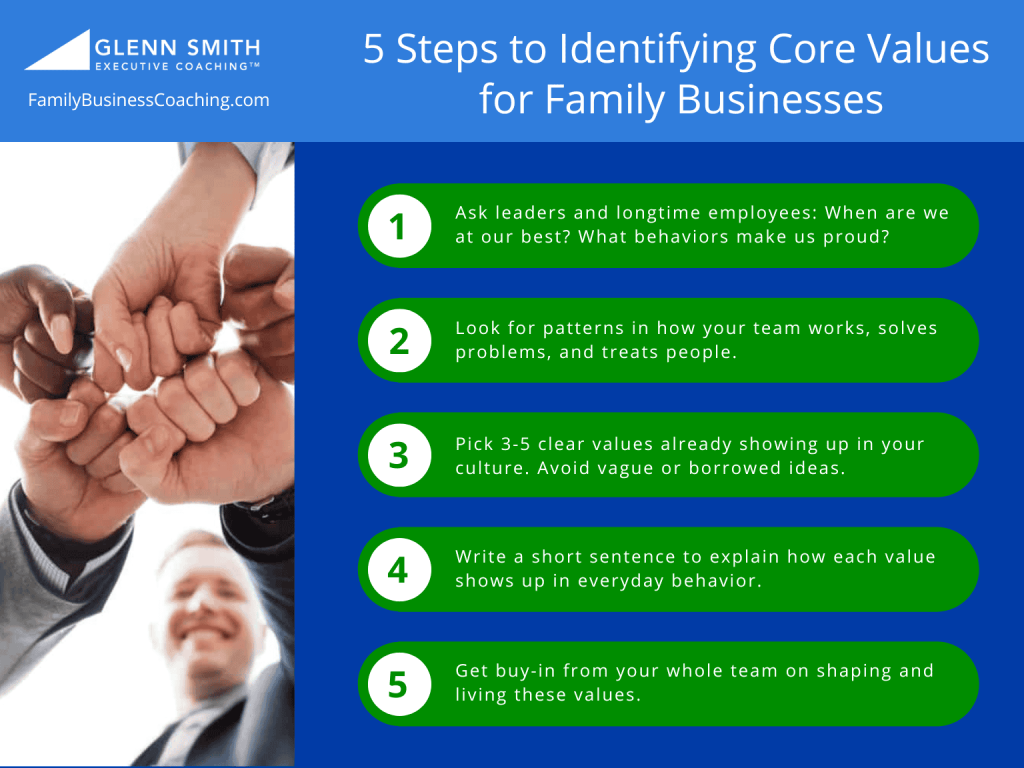Every family business reaches a point where things get a little murky. Maybe you’re bringing in the next generation, adding a new employee, or trying to move in a different direction. People care deeply, which is a strength, but it can also get messy. Roles blur. Emotions run close to the surface. Decisions start to feel personal.
Core values won’t solve everything, but they give you a steady place to stand.
They clarify how the business makes decisions, how people treat one another, and what the company truly stands for—beyond profit or tradition. They guide you through growth, transitions, and conflict. They create consistency in a business that’s built on relationships, not hierarchy. And when done right, they carry your company’s identity across generations.
So if your business is feeling pulled in different directions—or if you’re thinking about what legacy you’re building—start here.
What Core Values Actually Are (And What They’re Not)
Let’s clear up the confusion: core values aren’t slogans. They’re not plucked from someone else’s website or written once and forgotten.
Real values reflect how your business already operates at its best. They show up in hiring decisions, client conversations, leadership meetings, and late-night problem-solving. They shape your team’s habits and attitudes, especially when the pressure’s on.
You’ll know you’ve found your values when they start answering real questions:
- What kind of behavior do we reward?
- How do we handle mistakes?
- What kind of people thrive here?
- What lines won’t we cross, no matter what?
If your values don’t help you navigate those questions, they’re probably just words on a page.
Why Core Values Matter So Much in Family Businesses
Core values aren’t just a feel-good exercise. In a family business, they serve a practical purpose. You’re working in an environment where business decisions and personal dynamics constantly overlap. That can lead to blurred roles, tension between generations, or inconsistent leadership.
Values give you something solid to stand on. They bring clarity, alignment, and accountability across relationships, decisions, and growth. Here are the big three reasons to prioritize core values in family businesses:
1. They create common ground.
Every generation brings different ideas and priorities to the table. In a family business, core values give everyone a shared foundation to work from, so progress doesn’t come at the cost of legacy—or vice versa.
When you’ve defined what really matters, it’s easier to move in the same direction, even if people bring different approaches.
2. They guide real decisions.
Values give you a filter when the path forward isn’t obvious. They help you choose who to hire, how to resolve conflict, and what kind of leadership you want to model—without relying on emotion or habit.
Instead of reacting, you’re leading with intention.
3. They protect your family business culture.
Culture isn’t just how things feel—it’s how people behave. Values help you define those expectations clearly, apply them consistently, and keep the company grounded as it grows.
They make the unspoken things visible, so they’re easier to uphold.

How to Define Core Values That Actually Work
The process doesn’t have to be complicated. But it does need to be honest.
Start by asking your leadership team—and ideally, a few long-time employees—what behaviors and decisions represent the business at its best. Look for the through-lines. What’s already showing up, even if no one’s named it yet?
Then, distill those insights down to three to five clear, actionable values. Not fluffy ones. Not vague ones. And definitely not borrowed ones.
Here are a few tips:
- Be specific. “Respect” on its own is too broad. Try something like, We speak plainly and listen fully, no matter the title or role.
- Give context. One short sentence underneath each value helps anchor it in behavior.
- Involve multiple voices. When people help shape the values, they’re more likely to live them.
And don’t overdo it. Five values is plenty. Any more, and they lose power.

Keeping Core Values Alive in Family Business Culture
Once your values are set, it’s your job to make them visible and real.
That means working them into your rhythms. Hiring. Onboarding. Performance reviews. Team meetings. Leadership decisions.
You don’t need to turn every meeting into a seminar on values. But you do need to bring them up often enough that people know they’re not just window dressing.
- Highlight them in team huddles.
- Recognize employees who live them out.
- Use them to explain tough decisions.
And most importantly, model them. Especially at the top. When leadership walks the talk, values become culture. When leadership doesn’t, people stop listening.
For tips on integrating values into business management, check out our blog, What Does a Manager Do in a Family Business?
Hiring With Core Values in Mind
In a family-run business, hiring decisions carry extra weight. You’re bringing someone into a tight-knit team—sometimes even a family dynamic. Skills matter, of course. But if the person doesn’t align with your values, things unravel quickly. This is especially true in smaller teams, where one person’s attitude or behavior has an outsized impact.
Core values help you get ahead of that. They give you something more concrete than just “culture fit” or gut instinct. You can ask better questions, spot red flags sooner, and make clearer decisions about who belongs on your team.
Imagine this: Your company values transparency and follow-through. You’re interviewing a highly qualified candidate with a great track record. But during the process, they brush off questions they don’t like and sidestep ownership for past mistakes. On paper, they’re ideal. In practice, they’re likely to disrupt your family business culture.
When you hire with values in mind, you’re building a stronger, more cohesive team—not just filling seats.
Don’t think you need outside employees? Don’t be so sure. Read our article, Why Your Family Business Needs Non-Family Employees, for the why and how of hiring outside the family.
Making Values Part of Everyday Work
The best values aren’t just discussed once a year in a planning session. They show up in the daily flow of work. They’re in how you handle customer complaints, how you lead meetings, and how you manage disagreements. They influence:
- Decision-making: When you’re torn between two paths, your values help point to the one that fits your identity.
- Conflict resolution: When tension rises, values help you separate personalities from principles.
- Accountability: When someone misses the mark, values give you something objective to reference—something everyone agreed on, not just your personal opinion.
And yes, that includes family members. If you want your values to mean something, they have to apply to everyone. No free passes.
Core Values Pitfalls to Avoid
Plenty of businesses talk about values. Fewer actually live by them. Here are a few common traps to avoid:
| Mistake | Why It’s a Problem |
| Copying values from another company | They sound generic, and no one connects with them. |
| Choosing vague, abstract words | Hard to act on. Easy to ignore. |
| Letting family members bend the rules | Undermines trust and creates resentment. |
| Only using values in good times | They matter most when things get hard. |
If your values don’t help you make difficult decisions, they’re not doing their job.
Wrapping It Up
At their core, family businesses are built on trust. That trust comes from consistency: how you treat people, how you navigate conflict, how you make decisions when no one’s watching.
If it’s been a while since your team talked about values, take the time. Ask what still rings true, what needs to evolve, and how your leadership team is living the values today. You don’t have to get it perfect. But you do have to mean it.
If you need help getting that conversation started, Glenn Smith Executive Coaching can help. We’ve helped dozens of family-owned businesses target and integrate core values into their business culture over the years. Let’s find the pillars that make your family strong and your business stronger.
Looking for more tools to help your family business lead well, grow smart, and build a meaningful legacy?
Browse our blog, explore coaching services, or reach out to Glenn for a one-on-one consult. Sometimes, clarity starts with a single conversation.


